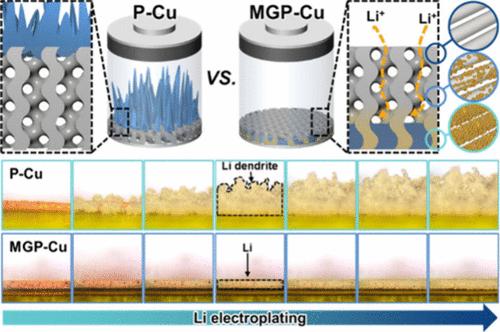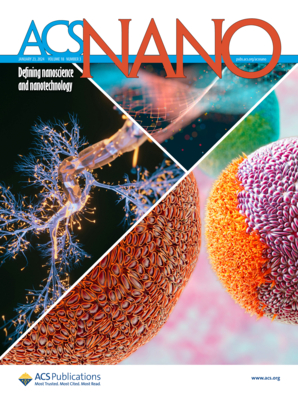为无树枝状突变锂金属电池设计具有梯度种子的电化学定制主机
IF 15.8
1区 材料科学
Q1 CHEMISTRY, MULTIDISCIPLINARY
引用次数: 0
摘要
本文章由计算机程序翻译,如有差异,请以英文原文为准。

Electrochemically Tailored Host Design with Gradient Seeds for Dendrite-Free Li Metal Batteries
Dendritic challenges in Li metal batteries are commonly resolved using porous three-dimensional (3D) current collectors, which have a significant issue in that Li is deposited from the top (top growth) of the structure rather than from the bottom (bottom growth), failing to effectively suppress dendrite growth and volumetric expansion. We propose the structure incorporating a gradient lithiophilic seed within a 3D framework by pulse electroplating Mg, specifically targeting the near bottom to promote bottom growth and achieve dense Li deposition. This method achieves precise control over the catalytic seed size and distribution. Optimal conditions for maximizing the catalytic effect are identified. The resulting Mg-gradient porous-Cu structure exhibits superior Li-plating behavior with bottom growth, significantly reducing dendrite formation and improving cycle life. The mechanistic origin of bottom-guided Li growth is supported by DFT and 3D simulation results. This method presents a significant step forward in developing high-performance Li–metal batteries.
求助全文
通过发布文献求助,成功后即可免费获取论文全文。
去求助
来源期刊

ACS Nano
工程技术-材料科学:综合
CiteScore
26.00
自引率
4.10%
发文量
1627
审稿时长
1.7 months
期刊介绍:
ACS Nano, published monthly, serves as an international forum for comprehensive articles on nanoscience and nanotechnology research at the intersections of chemistry, biology, materials science, physics, and engineering. The journal fosters communication among scientists in these communities, facilitating collaboration, new research opportunities, and advancements through discoveries. ACS Nano covers synthesis, assembly, characterization, theory, and simulation of nanostructures, nanobiotechnology, nanofabrication, methods and tools for nanoscience and nanotechnology, and self- and directed-assembly. Alongside original research articles, it offers thorough reviews, perspectives on cutting-edge research, and discussions envisioning the future of nanoscience and nanotechnology.
 求助内容:
求助内容: 应助结果提醒方式:
应助结果提醒方式:


